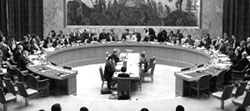- UN launches inquiry into American spying (UK Guardian)
- American Corporate Media Dodging U.N. Surveillance Story (FAIR)

UNITED NATIONS (FinalCall.com)–A London-based activist group, citing outrage over reports that the African country Angola is moving toward supporting the United States/United Kingdom resolution now being debated in the United Nations Security Council to declare war on Iraq, has called for world-wide demonstrations against Angolan embassies and consulates.
The announcement was made during a March 1 meeting in London after the British press reported on Angola’s plans. Angola is one of the six non-permanent members of the Security Council that U.S. officials have reportedly been targeting in their quest for the nine “yes” votes needed to pass the Security Council resolution.
U.S. Secretary of State Colin Powell recently told the British Broadcasting Corp. that the U.S. has “no plans to strong arm any member of the Security Council.”
But Michael Ratner, president of the New York-based Center for Constitutional Rights, said, “It is widely known that the United States uses promises of foreign aid to get votes at the UN.” Noting that the $26-billion U.S. aid package for Turkey, if they allow American troops to amass on their border with Iraq, is an example of U.S. checkbook diplomacy.
Meanwhile, a Feb. 1 New York Times article reported that military contractors such as Boeing, Northrop Grumman and Lockheed Martin make billions of dollars from U.S. foreign weapons sales, and the companies agree to finance “offsets,” or what used to be called bribes, to top officials of client states.
The story cited, as an example, an agreement between American defense companies and the United Arab Emirates, where projects such as building a shipyard are in progress.
Coincidentally, the president of the UAE called for Iraqi President Saddam Hussein to step down, during the meeting of Arab heads of state on March 1. Former U.S. Senator James Abourezk said he seriously doubts that any country receiving U.S. government aid could withstand U.S. economic pressure not to vote for U.S.-sponsored resolution in the Security Council.
“It would be a tragedy if a war were to be declared based on such pressure,” Mr. Abourezk said.
Observers also note that a “no” vote against the United States can bring on harsh penalties. They point to the 1991 Council vote that called for invading Iraq after it attacked Kuwait. Yemen was one of the 10 non-permanent Council members at the time, and they voted “no” on the first Gulf War.
At the time, Iraq received millions in U.S. aid. Phyllis Bennis, a fellow at the Washington-based Institute for Policy Studies remembers that a U.S. envoy turned to the Yemeni ambassador and told him that his “no” vote would be the most expensive “no” vote he would ever cast, and almost immediately the $24 million in annual U.S. aid to Yemen dried up.
“The Yemen precedent remains a vivid institutional memory at the UN,” Ms. Bennis said. Today most of the 10-non-permanent Security Council members receive either U.S. military or economic aid.
According to reports, Bulgaria is the largest benefactor with $31.5 million in military aid and another $97 million in economic grants, while Pakistan gets $50 million in military grants. Angola receives $100,000 for military education and training and $19 million in development assistance. Cameroon receives $200,000 in military training aid and $26 million in economic aid. Mexico receives $44 million in development aid. Chile gets $1.5 million in military grants.
“For a long time now, we have been asking for help to rebuild our country after years of war,” Angola’s Ambassador Ismael Gaspars Martins said, adding, “No one is tying the request to support on the Iraq resolution, but it is all happening at the same time.”
“The bribery issue is starting to appear on everyone’s radar screen. It is no longer something just talked about at the UN,” Lawrence Hamm, of the Newark-based Peoples Organization for Progress, told The Final Call. He said the Pentagon estimates the cost of a war against Iraq at $60 billion, while other analysts have calculated that war and long-term occupation could cost $2 trillion.
Mr. Hamm said that while students are struggling to pay for a college education, President George W. Bush has frozen the 2004 funding for Pell Grants, which give financial assistance to low-income students. He also said the president wants to totally eliminate Youth Opportunity Grants, which provide job training for youth, and a 24 percent reduction in vocational and technical education grants.
“But what the president says to these young people is be all that you can be in the Army,” Mr. Hamm said.
“Our communities are waking up. I believe that this Security Council bribery issue will cause those fence sitters to get off the fence,” Mr. Hamm stressed, citing the recent example in Montclair, N.J., where the city council had refused to back a call for a resolution condemning the war.
“The students from Montclair High School marched to the council meeting in February demanding to be heard on the war issue. At the March meeting the resolution will be presented, and it will probably pass,” Mr. Hamm said.












